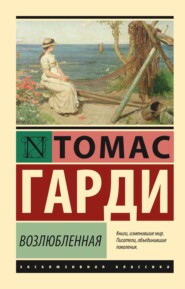По всем вопросам обращайтесь на: info@litportal.ru
(©) 2003-2025.
✖
The Woodlanders
Настройки чтения
Размер шрифта
Высота строк
Поля
She was obliged to admit that he had not.
"Then I think that you might get your heart out of that grave," said he, with playful sadness. "It has been there a long time."
She faintly shook her head, but said, "I'll try to think of you more – if I can."
With this Fitzpiers was compelled to be satisfied, and he asked her when she would meet him again.
"As we arranged – in a fortnight."
"If it must be a fortnight it must!"
"This time at least. I'll consider by the day I see you again if I can shorten the interval."
"Well, be that as it may, I shall come at least twice a week to look at your window."
"You must do as you like about that. Good-night."
"Say 'husband.'"
She seemed almost inclined to give him the word; but exclaiming, "No, no; I cannot," slipped through the garden-hedge and disappeared.
Fitzpiers did not exaggerate when he told her that he should haunt the precincts of the dwelling. But his persistence in this course did not result in his seeing her much oftener than at the fortnightly interval which she had herself marked out as proper. At these times, however, she punctually appeared, and as the spring wore on the meetings were kept up, though their character changed but little with the increase in their number.
The small garden of the cottage occupied by the Tangs family – father, son, and now son's wife – aligned with the larger one of the timber-dealer at its upper end; and when young Tim, after leaving work at Melbury's, stood at dusk in the little bower at the corner of his enclosure to smoke a pipe, he frequently observed the surgeon pass along the outside track before-mentioned. Fitzpiers always walked loiteringly, pensively, looking with a sharp eye into the gardens one after another as he proceeded; for Fitzpiers did not wish to leave the now absorbing spot too quickly, after travelling so far to reach it; hoping always for a glimpse of her whom he passionately desired to take to his arms anew.
Now Tim began to be struck with these loitering progresses along the garden boundaries in the gloaming, and wondered what they boded. It was, naturally, quite out of his power to divine the singular, sentimental revival in Fitzpiers's heart; the fineness of tissue which could take a deep, emotional – almost also an artistic – pleasure in being the yearning inamorato of a woman he once had deserted, would have seemed an absurdity to the young sawyer. Mr. and Mrs. Fitzpiers were separated; therefore the question of affection as between them was settled. But his Suke had, since that meeting on their marriage-day, repentantly admitted, to the urgency of his questioning, a good deal concerning her past levities. Putting all things together, he could hardly avoid connecting Fitzpiers's mysterious visits to this spot with Suke's residence under his roof. But he made himself fairly easy: the vessel in which they were about to emigrate sailed that month; and then Suke would be out of Fitzpiers's way forever.
The interval at last expired, and the eve of their departure arrived. They were pausing in the room of the cottage allotted to them by Tim's father, after a busy day of preparation, which left them weary. In a corner stood their boxes, crammed and corded, their large case for the hold having already been sent away. The firelight shone upon Suke's fine face and form as she stood looking into it, and upon the face of Tim seated in a corner, and upon the walls of his father's house, which he was beholding that night almost for the last time.
Tim Tangs was not happy. This scheme of emigration was dividing him from his father – for old Tangs would on no account leave Hintock – and had it not been for Suke's reputation and his own dignity, Tim would at the last moment have abandoned the project. As he sat in the back part of the room he regarded her moodily, and the fire and the boxes. One thing he had particularly noticed this evening – she was very restless; fitful in her actions, unable to remain seated, and in a marked degree depressed.
"Sorry that you be going, after all, Suke?" he said.
She sighed involuntarily. "I don't know but that I be," she answered. "'Tis natural, isn't it, when one is going away?"
"But you wasn't born here as I was."
"No."
"There's folk left behind that you'd fain have with 'ee, I reckon?"
"Why do you think that?"
"I've seen things and I've heard things; and, Suke, I say 'twill be a good move for me to get 'ee away. I don't mind his leavings abroad, but I do mind 'em at home."
Suke's face was not changed from its aspect of listless indifference by the words. She answered nothing; and shortly after he went out for his customary pipe of tobacco at the top of the garden.
The restlessness of Suke had indeed owed its presence to the gentleman of Tim's suspicions, but in a different – and it must be added in justice to her – more innocent sense than he supposed, judging from former doings. She had accidentally discovered that Fitzpiers was in the habit of coming secretly once or twice a week to Hintock, and knew that this evening was a favorite one of the seven for his journey. As she was going next day to leave the country, Suke thought there could be no great harm in giving way to a little sentimentality by obtaining a glimpse of him quite unknown to himself or to anybody, and thus taking a silent last farewell. Aware that Fitzpiers's time for passing was at hand she thus betrayed her feeling. No sooner, therefore, had Tim left the room than she let herself noiselessly out of the house, and hastened to the corner of the garden, whence she could witness the surgeon's transit across the scene – if he had not already gone by.
Her light cotton dress was visible to Tim lounging in the arbor of the opposite corner, though he was hidden from her. He saw her stealthily climb into the hedge, and so ensconce herself there that nobody could have the least doubt her purpose was to watch unseen for a passer-by.
He went across to the spot and stood behind her. Suke started, having in her blundering way forgotten that he might be near. She at once descended from the hedge.
"So he's coming to-night," said Tim, laconically. "And we be always anxious to see our dears."
"He IS coming to-night," she replied, with defiance. "And we BE anxious for our dears."
"Then will you step in-doors, where your dear will soon jine 'ee? We've to mouster by half-past three to-morrow, and if we don't get to bed by eight at latest our faces will be as long as clock-cases all day."
She hesitated for a minute, but ultimately obeyed, going slowly down the garden to the house, where he heard the door-latch click behind her.
Tim was incensed beyond measure. His marriage had so far been a total failure, a source of bitter regret; and the only course for improving his case, that of leaving the country, was a sorry, and possibly might not be a very effectual one. Do what he would, his domestic sky was likely to be overcast to the end of the day. Thus he brooded, and his resentment gathered force. He craved a means of striking one blow back at the cause of his cheerless plight, while he was still on the scene of his discomfiture. For some minutes no method suggested itself, and then he had an idea.
Coming to a sudden resolution, he hastened along the garden, and entered the one attached to the next cottage, which had formerly been the dwelling of a game-keeper. Tim descended the path to the back of the house, where only an old woman lived at present, and reaching the wall he stopped. Owing to the slope of the ground the roof-eaves of the linhay were here within touch, and he thrust his arm up under them, feeling about in the space on the top of the wall-plate.
"Ah, I thought my memory didn't deceive me!" he lipped silently.
With some exertion he drew down a cobwebbed object curiously framed in iron, which clanked as he moved it. It was about three feet in length and half as wide. Tim contemplated it as well as he could in the dying light of day, and raked off the cobwebs with his hand.
"That will spoil his pretty shins for'n, I reckon!" he said.
It was a man-trap.
CHAPTER XLVII
Were the inventors of automatic machines to be ranged according to the excellence of their devices for producing sound artistic torture, the creator of the man-trap would occupy a very respectable if not a very high place.
It should rather, however, be said, the inventor of the particular form of man-trap of which this found in the keeper's out-house was a specimen. For there were other shapes and other sizes, instruments which, if placed in a row beside one of the type disinterred by Tim, would have worn the subordinate aspect of the bears, wild boars, or wolves in a travelling menagerie, as compared with the leading lion or tiger. In short, though many varieties had been in use during those centuries which we are accustomed to look back upon as the true and only period of merry England – in the rural districts more especially – and onward down to the third decade of the nineteenth century, this model had borne the palm, and had been most usually followed when the orchards and estates required new ones.
There had been the toothless variety used by the softer-hearted landlords – quite contemptible in their clemency. The jaws of these resembled the jaws of an old woman to whom time has left nothing but gums. There were also the intermediate or half-toothed sorts, probably devised by the middle-natured squires, or those under the influence of their wives: two inches of mercy, two inches of cruelty, two inches of mere nip, two inches of probe, and so on, through the whole extent of the jaws. There were also, as a class apart, the bruisers, which did not lacerate the flesh, but only crushed the bone.
The sight of one of these gins when set produced a vivid impression that it was endowed with life. It exhibited the combined aspects of a shark, a crocodile, and a scorpion. Each tooth was in the form of a tapering spine, two and a quarter inches long, which, when the jaws were closed, stood in alternation from this side and from that. When they were open, the two halves formed a complete circle between two and three feet in diameter, the plate or treading-place in the midst being about a foot square, while from beneath extended in opposite directions the soul of the apparatus, the pair of springs, each one being of a stiffness to render necessary a lever or the whole weight of the body when forcing it down.
There were men at this time still living at Hintock who remembered when the gin and others like it were in use. Tim Tangs's great-uncle had endured a night of six hours in this very trap, which lamed him for life. Once a keeper of Hintock woods set it on the track of a poacher, and afterwards, coming back that way, forgetful of what he had done, walked into it himself. The wound brought on lockjaw, of which he died. This event occurred during the thirties, and by the year 1840 the use of such implements was well-nigh discontinued in the neighborhood. But being made entirely of iron, they by no means disappeared, and in almost every village one could be found in some nook or corner as readily as this was found by Tim. It had, indeed, been a fearful amusement of Tim and other Hintock lads – especially those who had a dim sense of becoming renowned poachers when they reached their prime – to drag out this trap from its hiding, set it, and throw it with billets of wood, which were penetrated by the teeth to the depth of near an inch.
As soon as he had examined the trap, and found that the hinges and springs were still perfect, he shouldered it without more ado, and returned with his burden to his own garden, passing on through the hedge to the path immediately outside the boundary. Here, by the help of a stout stake, he set the trap, and laid it carefully behind a bush while he went forward to reconnoitre. As has been stated, nobody passed this way for days together sometimes; but there was just a possibility that some other pedestrian than the one in request might arrive, and it behooved Tim to be careful as to the identity of his victim.
Going about a hundred yards along the rising ground to the right, he reached a ridge whereon a large and thick holly grew. Beyond this for some distance the wood was more open, and the course which Fitzpiers must pursue to reach the point, if he came to-night, was visible a long way forward.
For some time there was no sign of him or of anybody. Then there shaped itself a spot out of the dim mid-distance, between the masses of brushwood on either hand. And it enlarged, and Tim could hear the brushing of feet over the tufts of sour-grass. The airy gait revealed Fitzpiers even before his exact outline could be seen.
Tim Tangs turned about, and ran down the opposite side of the hill, till he was again at the head of his own garden. It was the work of a few moments to drag out the man-trap, very gently – that the plate might not be disturbed sufficiently to throw it – to a space between a pair of young oaks which, rooted in contiguity, grew apart upward, forming a V-shaped opening between; and, being backed up by bushes, left this as the only course for a foot-passenger. In it he laid the trap with the same gentleness of handling, locked the chain round one of the trees, and finally slid back the guard which was placed to keep the gin from accidentally catching the arms of him who set it, or, to use the local and better word, "toiled" it.
Having completed these arrangements, Tim sprang through the adjoining hedge of his father's garden, ran down the path, and softly entered the house.
Obedient to his order, Suke had gone to bed; and as soon as he had bolted the door, Tim unlaced and kicked off his boots at the foot of the stairs, and retired likewise, without lighting a candle. His object seemed to be to undress as soon as possible. Before, however, he had completed the operation, a long cry resounded without – penetrating, but indescribable.
"What's that?" said Suke, starting up in bed.

















